The Role of Holistic Approaches in Medication Management Programs

Exploring Holistic Integration in Medication Management
In recent years, healthcare has seen a transformative shift towards holistic approaches, particularly in medication management programs. With an emphasis on treating the individual as a whole, this approach incorporates emotional, social, and psychological dimensions alongside traditional medical treatments. As patients increasingly seek treatments that respect their unique lifestyles and needs, understanding the role of holistic practices in medication management is crucial for both patients and healthcare providers. This narrative delves into the significance, benefits, and challenges of integrating holistic methods into contemporary medication management strategies.
The Essence of Holistic Health Management
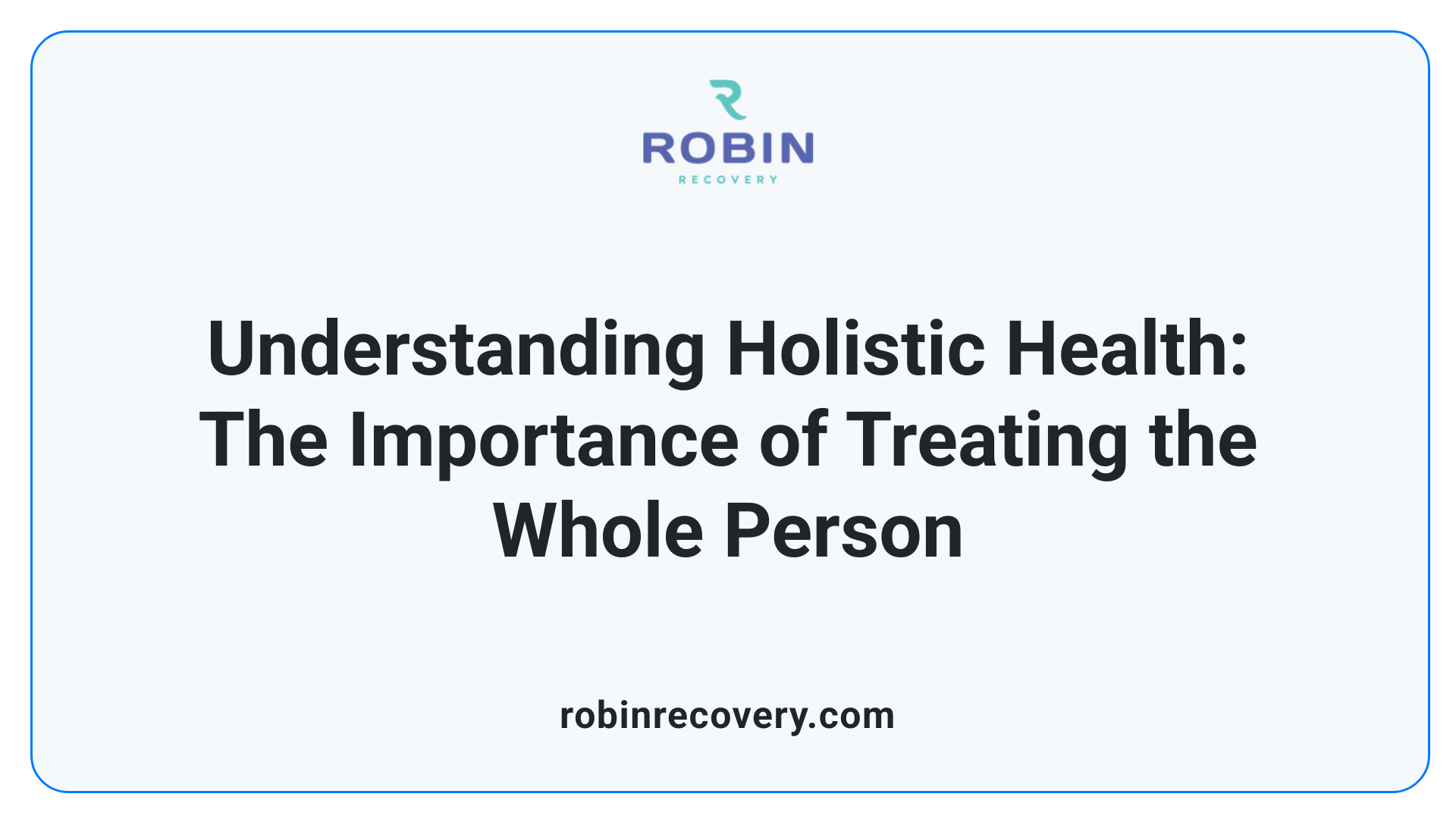
What is the holistic approach to health management?
The holistic approach to health management emphasizes treating the whole person—body, mind, and spirit—rather than focusing solely on specific symptoms or diseases. It incorporates scientifically proven complementary therapies and prioritizes wellness and prevention, recognizing the interconnectedness of physical, mental, spiritual, and social needs.
Why is treating the whole person important?
Holistic health acknowledges that stress and psychological conditions can lead to physical symptoms, and vice versa, illustrating how these aspects influence each other. This comprehensive approach not only addresses immediate health concerns but also aims to improve overall well-being by considering various factors, such as:
- Lifestyle Choices: Assessing diet, exercise, and daily routines.
- Emotional Health: Including therapies that strengthen mental and emotional stability.
- Social Connections: Fostering relationships that support mental health outcomes.
- Spiritual Needs: Integrating beliefs and values that contribute to a person's identity.
Engaging patients in their care helps them set wellness goals and make lifestyle changes. By using a variety of clinically proven therapies, both conventional medicine and alternative practices, holistic health promotes not just healing, but a sustainable path to well-being.
Component Importance Holistic Practice Physical Health Vital for overall wellness Nutritional counseling, exercise programs Emotional Stability Key for mental health Mindfulness practices, talk therapy Social Engagement Reduces feelings of isolation Support groups, community activities Spiritual Health Enhances inner peace Yoga, meditation
Holistic Medicine: An Integrative Approach
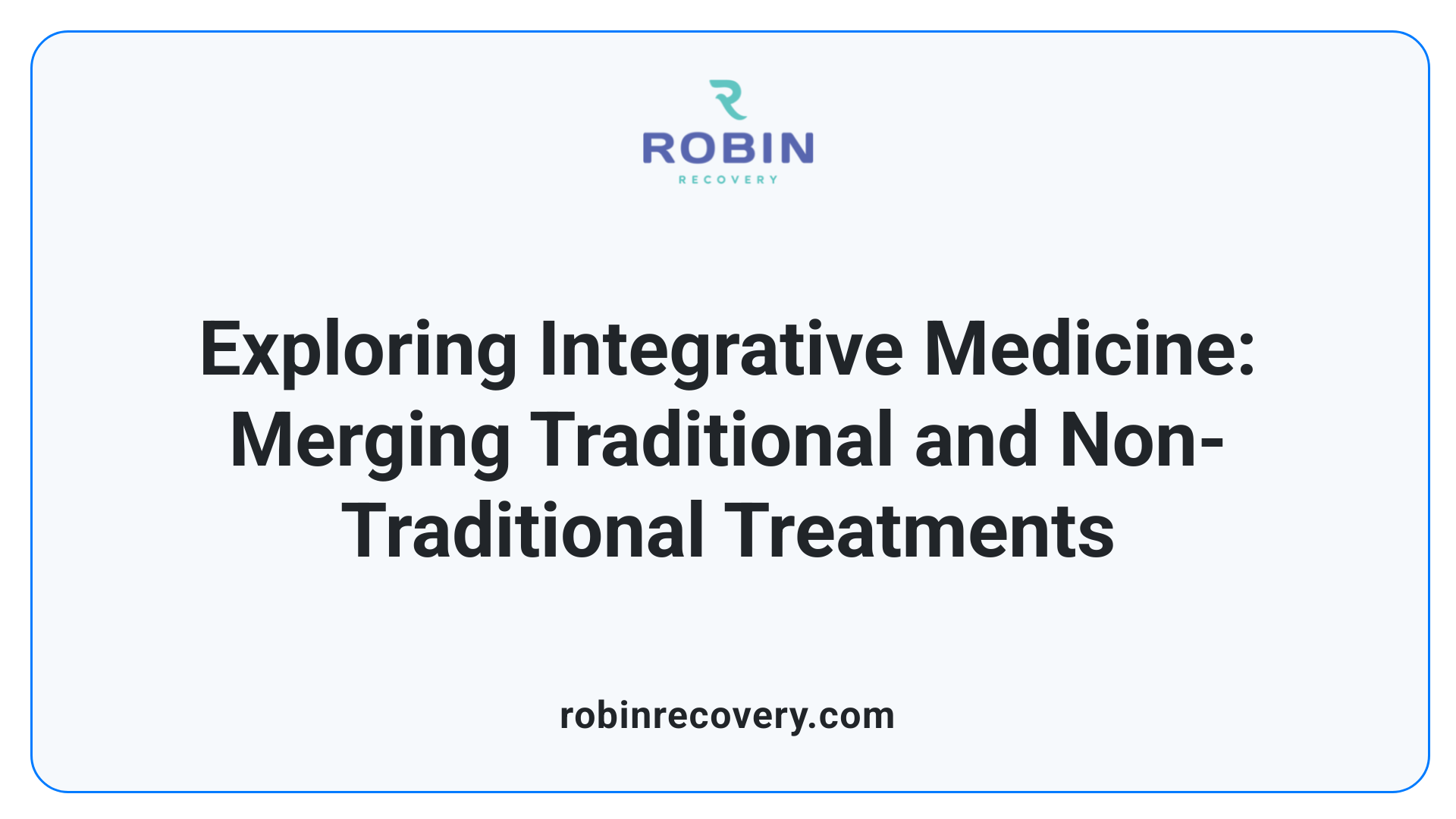
What does a holistic approach to medicine do?
A holistic approach to medicine considers the whole person—body, mind, spirit, and emotions—during diagnosis and treatment, promoting comprehensive health care. Holistic practitioners address not just symptoms but also underlying causes by examining various factors that can influence a patient's health.
These providers often integrate traditional medical practices with alternative therapies. This includes evidence-based treatments such as acupuncture, chiropractic care, and the implementation of lifestyle modifications to support overall wellness. In doing so, they establish a balance aimed at fostering optimal well-being for their patients.
Moreover, holistic medicine emphasizes preventive care as a core component. By focusing on lifestyle and wellness strategies, holistic providers believe that health outcomes improve when patients are engaged in their own care. They collaborate closely with primary care physicians and specialists to create individualized treatment plans tailored to each patient's unique circumstances.
This helps in addressing not just the physical symptoms, but emotional, social, and spiritual needs as well. By treating the individual as a whole, holistic medicine seeks not only to enhance the quality of life but to promote true healing and resilience, enabling patients to thrive physically and mentally.
Holistic AspectsKey ComponentsImpact on Health Outcomes Body Physical Health Reduces hospital visits Mind Emotional Wellness Improves coping mechanisms Spirit Spiritual Well-being Enhances life satisfaction Emotions Mental Stability Lowers anxiety/depression levels
The principles of holistic medicine position each patient as unique, championing their right to individualized care and the prioritization of their comprehensive well-being.
Additional information can be found in studies regarding the benefits of a holistic approach in medicine.
Holistic Management in Healthcare Systems
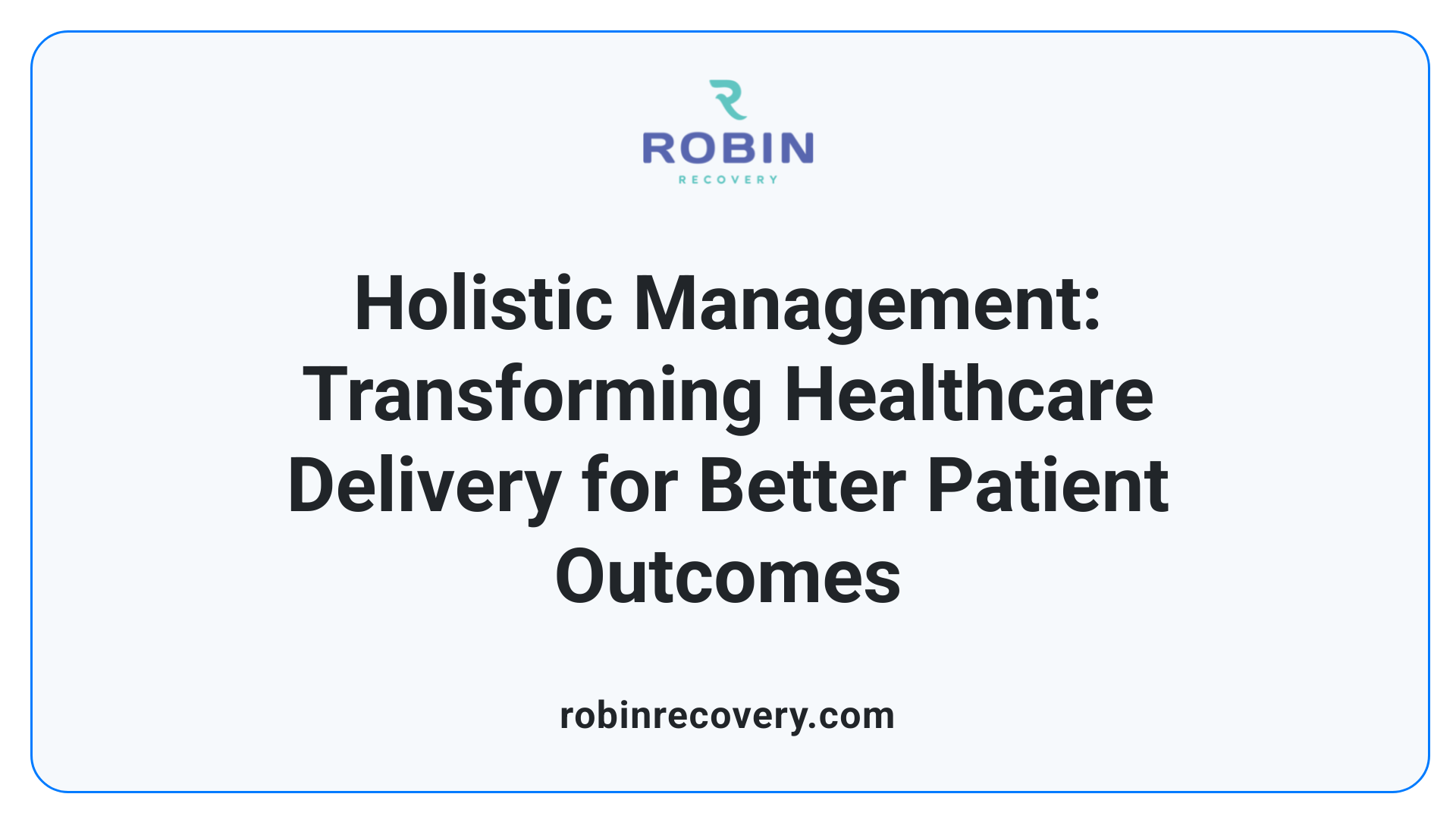
What role does holistic management play in healthcare?
Holistic management plays a vital role in healthcare by promoting a comprehensive approach that considers the interconnectedness of physical, emotional, social, and spiritual well-being. This perspective shifts the focus from merely treating symptoms to understanding the whole person, which is essential for effective treatment.
Adopting diverse treatment strategies tailored to individual circumstances and needs is a key tenet of holistic management. This approach fosters interdisciplinary collaboration among various healthcare professionals, ensuring that patients receive coordinated care that comprehensively addresses different aspects of their health.
Creating supportive environments is crucial as well. Holistic management emphasizes conditions that enable patients to feel secure and engaged, ultimately enhancing their satisfaction and involvement in their treatment processes.
Comprehensive care strategies
The implementation of Comprehensive Medication Management (CMM) services further exemplifies how holistic care can be effectively delivered. CMM focuses on understanding the patient’s total environment, including their socioeconomic situation and mental, emotional, and physical health.
In addition, studies indicate that incorporating holistic practices like mindfulness and nutritional counseling into traditional medication management can significantly improve treatment adherence and overall health outcomes.
Interdisciplinary collaboration
Collaboration among healthcare providers is essential in holistic management. This synergy allows for a more integrated approach to patient treatment plans, which enhance efficacy and minimize adverse effects from medications.
Interprofessional teams can develop comprehensive care plans that recognize and respond to the unique factors impacting each patient’s health. This approach empowers patients to take an active role in their treatment journeys, thus improving their health outcomes.
Integration of Holistic Approaches in Medication Management
Holistic practices in medication schedules and adherence
Medication management involves not only adherence to prescribed schedules but also aligning medications with patients' lifestyles. A holistic approach considers various factors that may influence adherence, including a patient’s daily routine, dietary habits, and emotional state.
Understanding these elements enhances the personalization of treatment plans. When healthcare providers acknowledge the interplay of these aspects, they can adjust medication regimens to fit individual lifestyles. This personalization can significantly improve both medication compliance and overall health outcomes.
Complementary therapies alongside conventional medication
Integrative psychiatry exemplifies the fusion of conventional pharmacological treatments with complementary therapies, such as nutritional counseling, exercise, mindfulness, and psychotherapy. For instance, implementing cognitive-behavioral therapy (CBT) alongside prescribed medications can address underlying emotional patterns, facilitating a more comprehensive treatment of mental health conditions.
Moreover, this integrative approach allows for the management of side effects and enhances patient motivation by involving them actively in their recovery process. Research indicates that incorporating holistic strategies not only boosts adherence to medication but also leads to improved recovery outcomes, making it an indispensable component of effective medication management.
Benefits of Personalized Holistic Treatment Plans
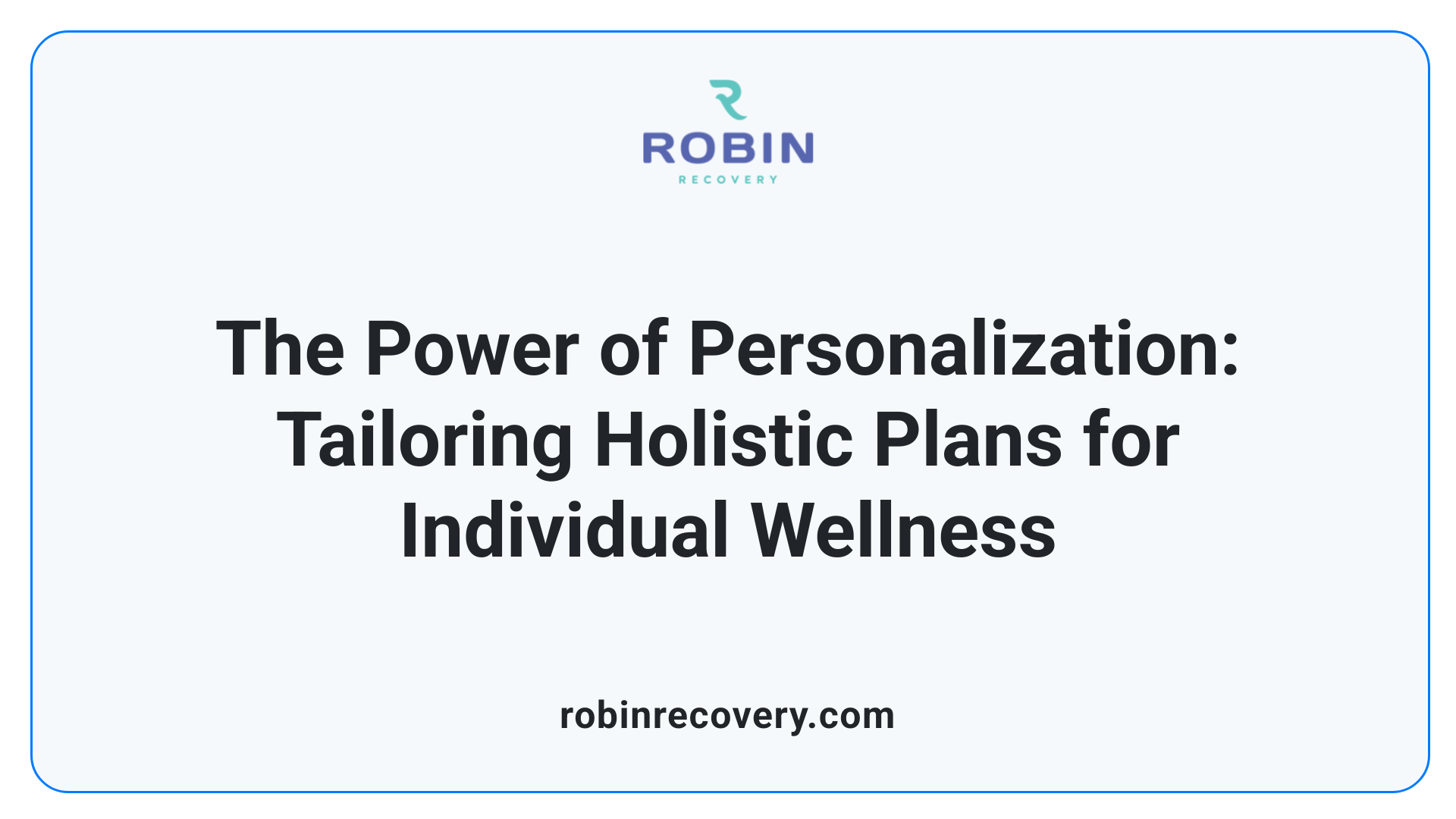
What are the benefits of personalized holistic care plans?
Personalized holistic care plans align medical treatments with a patient's lifestyle and individual needs, enhancing adherence and minimizing adverse effects. This approach focuses on recognizing the interconnectedness of physical, emotional, and social factors that impact health outcomes.
Healthcare providers consider various aspects, such as personality, cognitive patterns, and social interactions, to develop treatment strategies that are compatible with the patient’s daily life. This tailored approach fosters a supportive therapeutic environment that encourages open communication, allowing patients to feel understood and empowered.
By addressing not just the physical symptoms but also emotional and psychological aspects, personalized treatment plans promote overall well-being. Improved communication between patients and providers can lead to better understanding of medication regimens, ultimately enhancing adherence.
Role of personalized medicine
Incorporating personalized medicine into treatment practices ensures that decisions are based on individual factors, allowing for a more precise application of therapies. This means that adjustments can be made based on personal experiences and preferences, which is critical for effective medication management. The result is a comprehensive care approach that not only stabilizes symptoms but improves overall health satisfaction, bridging the gap between medical treatment and holistic wellness.
Challenges in Implementing Holistic Strategies
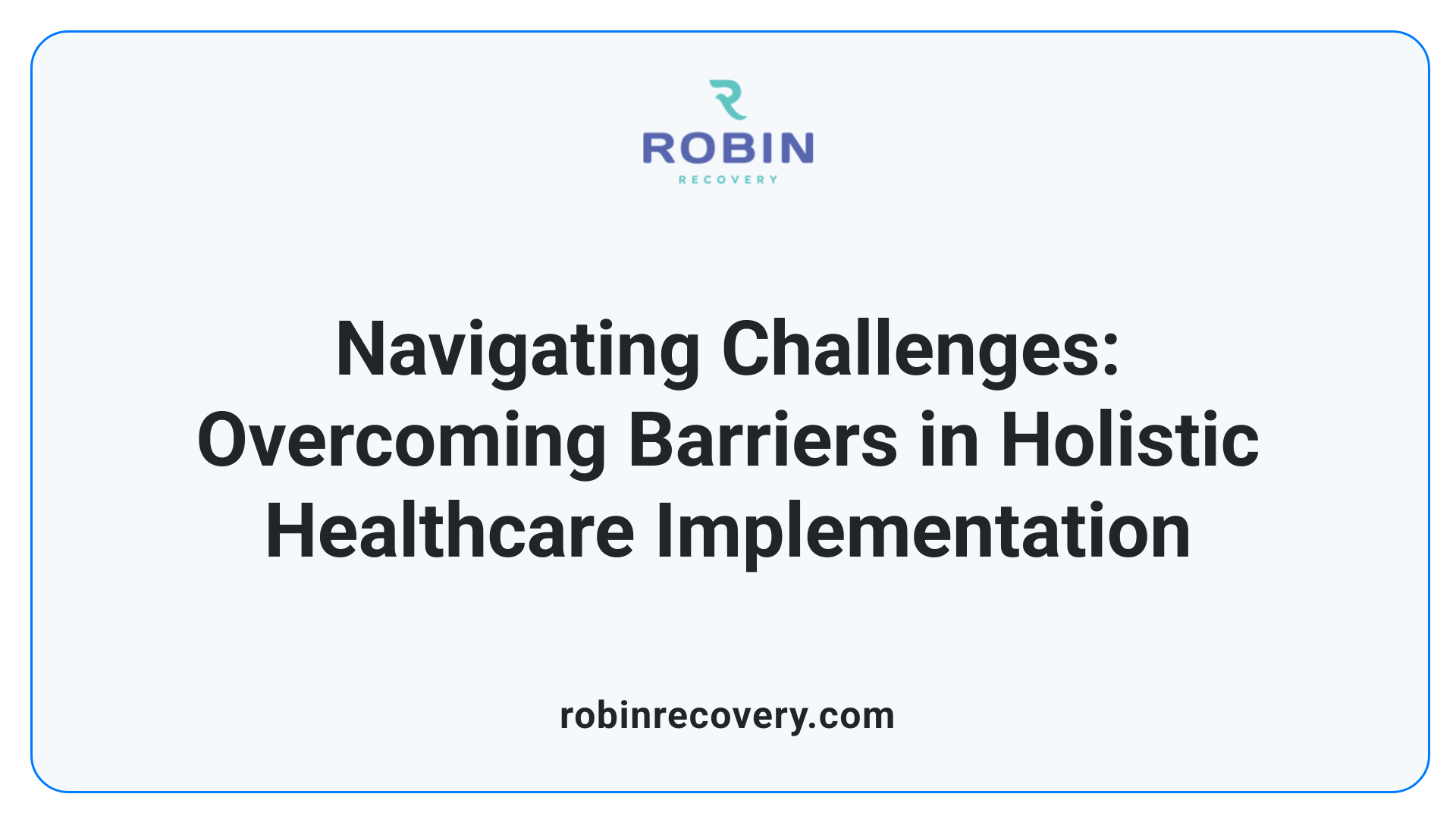
What challenges exist in implementing holistic approaches in medication management?
Implementing holistic approaches in medication management faces several significant challenges. Resource limitations are often at the forefront, as healthcare systems may lack the necessary funding and staffing to support comprehensive care strategies. This is especially true in environments already stretched thin, creating hurdles for fully integrating holistic practices into routine medication management.
Additionally, interprofessional collaboration is crucial yet often insufficient. A holistic approach requires the engagement of various healthcare providers—doctors, nurses, pharmacists, nutritionists, and therapists—working in tandem to address the diverse needs of a patient. Without effective communication and cooperation among these groups, patients may receive fragmented care.
Navigating varying patient expectations is another challenge. Some patients may prefer traditional medical practices, leading to reluctance toward holistic options. Educating both patients and healthcare providers about the benefits and applications of holistic practices is essential for overcoming skepticism and fostering acceptance.
Overcoming these barriers might involve robust training programs, policy amendments, and increased funding support for integrative healthcare models that promote comprehensive patient care.
Challenge Description Potential Solutions Resource Limitations Insufficient funding and staffing in healthcare systems hinder holistic practice implementation. Increased funding and resource allocation for holistic programs. Interprofessional Collaboration Lack of teamwork among healthcare practitioners can lead to disjointed and ineffective patient care. Developing structured communication protocols and collaborative care models. Patient Expectations Patients may be hesitant to embrace holistic methods due to familiarity with traditional treatments. Comprehensive education for patients on holistic benefits and practices.
Holistic Practices in Mental Health Care
How are holistic approaches applied in mental health care?
In mental health care, holistic approaches involve integrating a variety of complementary therapies alongside traditional medication management. This methodology not only emphasizes pharmaceutical interventions but also includes essential lifestyle modifications, social support networks, and psychotherapeutic techniques aimed at enhancing overall treatment effectiveness.
- Complementary Therapies:
- Nutritional changes that address deficiencies affecting neurotransmitter production.
- Mindfulness practices like meditation and yoga that promote emotional well-being.
- Therapies such as Cognitive Behavioral Therapy (CBT) and Dialectical Behavioral Therapy (DBT) focus on modifying cognitive and emotional patterns.
- Supportive Environments:
Establishing a therapeutic atmosphere is vital. Patients feel safe and understood, which encourages open communication and personalized care plans. - Individualized Treatment Plans:
Outpatient therapy and medication management can be tailored to suit the unique needs of each patient, promoting better adherence and satisfaction with the treatment plan. - Comprehensive Care:
This method allows for addressing mental health issues holistically, mitigating the symptoms of conditions such as anxiety, depression, and PTSD, thereby leading to improved mental health outcomes.
By prioritizing a multifaceted approach that recognizes the interconnectedness of mental, emotional, and physical health, holistic mental health care fosters better overall well-being for patients.
The Role of Holistic Approaches in Chronic Disease Management
How do holistic approaches benefit chronic disease management?
Holistic approaches in chronic disease management focus on treating the whole person. This means integrating various therapies to enhance general well-being, including natural and complementary methods like naturopathy, acupuncture, and mindfulness-based interventions alongside traditional medical treatments.
By emphasizing physical, mental, and emotional health, these holistic practices can support the better management of chronic conditions, such as autoimmune diseases and high blood pressure. For instance, integrating dietary adjustments aimed at improving nutrition can lead to enhanced health outcomes and even decrease reliance on medications.
Furthermore, this comprehensive model places significant importance on patient satisfaction through personalized care. When treatment plans consider an individual's lifestyle and preferences, patients are more likely to adhere to their management strategies.
Reducing medication reliance through holistic methods
Holistic care can also contribute to reduced reliance on pharmaceuticals. For some patients, integrative practices like yoga and mindfulness help in managing symptoms related to anxiety and stress, which are crucial for chronic illness management. This could lead to lower dosages or the discontinuation of certain medications, thus minimizing potential side effects associated with pharmaceutical treatments.
Ultimately, holistic approaches create a supportive environment that fosters better health, enhancing overall quality of life and ensuring a more balanced treatment of chronic illnesses.
Education and Resources for Holistic Health Integration
What resources support holistic health integration in medication management?
Educational resources play a crucial role in integrating holistic health into medication management. Home health nurses and outpatient therapy programs serve as vital educational platforms that guide patients on the benefits and practical applications of holistic approaches.
These resources include:
- Nutritional Interventions: Information on dietary changes that can enhance mental well-being and help with issues such as depression or anxiety.
- Exercise Programs: Promotion of physical activities that not only improve physical health but also support mental clarity and emotional balance.
- Mindfulness Practices: Encouragement of techniques like meditation and yoga that foster emotional resilience and overall mental health stability.
For mental health specifically, the emphasis is placed on the use of therapies like Cognitive Behavioral Therapy (CBT) in conjunction with medications. Outpatient therapy emphasizes:
- Supportive Care Environments: Creating spaces where patients feel safe to discuss their experiences and medications openly.
- Enhanced Communication: Fostering dialogue between patients and healthcare providers improves adherence and treatment outcomes by ensuring patients are fully informed about their health regimens.
The Future of Holistic Integration in Medication Management
As healthcare continues to evolve, the integration of holistic approaches in medication management programs is likely to expand, fostering a more inclusive and comprehensive care model. By addressing not only the physical symptoms but also the emotional, social, and spiritual aspects of health, holistic practices present a promising path forward for improved patient outcomes and satisfaction. The ongoing collaboration between medical professionals and holistic practitioners will be pivotal in overcoming current challenges, ultimately leading to healthcare systems that truly nurture the well-being of individuals in their entirety.
References
- Medication management requires 'holistic' approach - Relias Media
- Harmonizing Health How Integrative Psychiatry Marries Medication ...
- 4 Reasons to Love an Holistic Approach to Medicine - Charter College
- A Holistic Approach to Mental Health: Integrating Medication ...
- Integrating medicine with lifestyle for personalized and holistic ...
- Integrating Traditional and Modern Medicine | UMN CCAPS
- Comprehensive Medication Management Services with a Holistic ...
- A Holistic Approach to Mental Health - NKU Article
